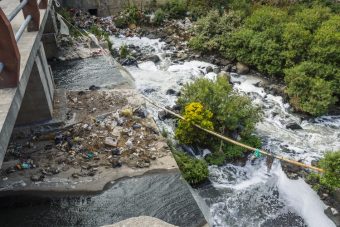Wastewater management in Serbia still lags behind European standards, and the number of treatment facilities remains far below the necessary level. In order to reach acceptable standards for protecting watercourses and align with European Union directives, it is essential to accelerate and improve this process significantly. However, the implementation of wastewater treatment plant projects faces numerous obstacles, including lack of transparency, complex bureaucratic procedures, and unclear criteria for fund allocation and technology selection.
These issues are thoroughly analyzed in a publication by the Regulatory Institute for Renewable Energy and the Environment (RERI) titled “Black Book: Murky Waters,” which summarizes months of research and tracking of investment flows in wastewater treatment plants.

According to Jovan Rajić, founder and head of RERI’s legal team, the research team initiated administrative procedures in seven cities to gather information on the implementation of wastewater treatment plant projects. However, despite requests for access to public information, city administrations refused to disclose the data, citing the confidentiality clause of the contract between the Government of Serbia and the German Development Bank (KfW).
“The ‘Black Book’ provides concrete evidence and documentation showing what happens when you are unable to obtain key information from the relevant authorities, even though they are legally obligated to share it with the public,” explains Rajić.
The decision-making system regarding where treatment plants will be built is also unclear. On paper, priority is given to municipalities that have made the most progress in project preparation, but these criteria are often vague and open to subjective interpretation. Additionally, there is no clearly defined public procurement process that would enable the selection of the most efficient and cost-effective technology.
IN FOCUS:
- Scientists from Vinča Designing a Multifunctional Filter for Wastewater Purification and Hydrogen Production
- From Waste To Fashion Show
- Reverse Vending Machines – A Smart Solution for a Clean Future
Lack of Transparency and a Prearranged Economy
Our interviewee emphasizes that their months-long attempts to obtain relevant information have been unsuccessful, with responsibility being shifted from one institution to another. He also highlights the issue of the state allowing private companies to independently decide where they will collect and analyze data, which in practice leads to delays in project implementation.
“The main issue is the lack of transparency, from the selection of municipalities that will receive treatment plants to the conditions under which loans are obtained and from whom. It is also unacceptable for contracts to be classified as state secrets, given that these are investments of public importance,” says Rajić.
He adds that these capital investments are crucial for the long-term efficiency of the water treatment system, yet the domestic market has already been divided among certain companies.
“There is no healthy market competition, public procurement is being neglected, and there is no body that would analyze and select the most suitable technology for the coming decades. Everything happens behind closed doors, with no public insight into how funds allocated for this sector are being spent,” concludes Rajić.
The Need for Reform and a Coordinating Body
Serbia currently has around 40 wastewater treatment plants, but only one-third operate at full capacity. To meet European standards, the country needs to build as many as 359 facilities. However, the centralized management system and the lack of a unified coordinating body represent major obstacles in this process.

The current wastewater management model relies on public utility companies, which are accountable to local governments. However, municipalities lack sufficient funds of their own and depend on central institutions, further complicating the decision-making process.
Experts suggest a regional approach to wastewater management, while infrastructure should remain local and decentralized. Such an organizational model would facilitate better information sharing, expertise exchange, and project coordination, ultimately leading to more efficient implementation. Establishing a single coordinating body, as foreseen by the Water Law, could contribute to more effective and transparent sector management and accelerate the construction of necessary infrastructure.
Wastewater management in Serbia requires urgent reforms and greater transparency. The decision-making process and fund allocation must be public and clear, and contracts should not be classified as confidential when dealing with projects of vital importance to citizens and the environment. Additionally, better coordination between local governments and central authorities is crucial to ensuring the continuity and long-term sustainability of investments, experts from RERI emphasize.
Prepared by: Milena Maglovski
The story was published in the Energy portal Magazine CIRCULAR ECONOMY

